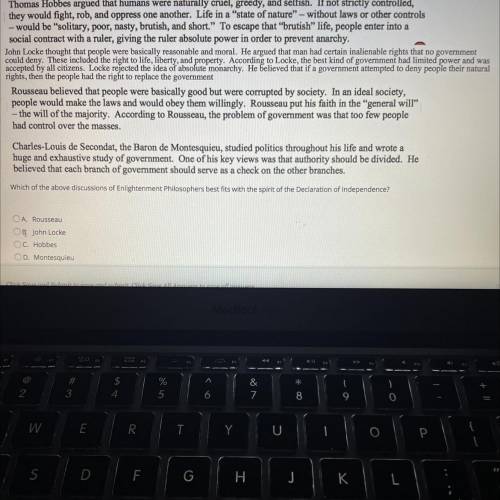
Social Studies, 08.02.2021 18:50 bwjester0
Thomas Hobbes argued that humans were naturally cruel, greedy, and selfish. If not strictly controlled,
they would fight, rob, and oppress one another. Life in a "state of nature" - without
laws or other controls
- would be "solitary, poor, nasty, brutish, and short." To escape that "brutish” life, people enter into a
social contract with a ruler, giving the ruler absolute power in order to prevent anarchy.
John Locke thought that people were basically reasonable and moral. He argued that man had certain inalienable rights that no government
could deny. These included the right to life, liberty, and property. According to Locke, the best kind of government had limited power and was
accepted by all citizens. Locke rejected the idea of absolute monarchy. He believed that if a government attempted to deny people their natural
rights, then the people had the right to replace the government
Rousseau believed that people were basically good but were corrupted by society. In an ideal society,
people would make the laws and would obey them willingly. Rousseau put his faith in the "general will”
- the will of the majority. According to Rousseau, the problem of government was that too few people
had control over the masses.
Charles-Louis de Secondat, the Baron de Montesquieu, studied politics throughout his life and wrote a
huge and exhaustive study of government. One of his key views was that authority should be divided. He
believed that each branch of government should serve as a check on the other branches.
Which of the above discussions of Enlightenment Philosophers best fits with the spirit of the Declaration of Independence?
A. Rosseau
B. John Locke
C. Hobbes
D. Montesquieu


Answers: 1
Another question on Social Studies

Social Studies, 22.06.2019 01:20
In piaget's stage, you would expect one to develop interest in ethics, politics, and social and moral issues.
Answers: 1

Social Studies, 22.06.2019 18:30
1. describe the concept of the unitary executive. discuss whether this concept is practical.
Answers: 1

Social Studies, 22.06.2019 19:50
The technique of getting a commitment from a potential customer and then changing the terms of the agreement is best described as low-balling. cognitive dissonance. reciprocal concession. the foot-in-the-door technique. a half-dozen high school students are going to a concert. chantal wants to wear a new colorful outfit that she just received as a gift, but she assumes that her five friends will all be wearing nothing but black leather. chantal decides to do likewise, and leaves her colorful outfit in the closet. chantal’s behavior is an example of conformity. resistance. reciprocation wariness. idiosyncrasy credits.
Answers: 3

Social Studies, 22.06.2019 21:30
The structure of the federal bureaucracy is well-known as being large and complex. which of the following is not part of the federal bureaucracy?
Answers: 3
You know the right answer?
Thomas Hobbes argued that humans were naturally cruel, greedy, and selfish. If not strictly controll...
Questions


Mathematics, 26.04.2021 08:10

Mathematics, 26.04.2021 08:10

Mathematics, 26.04.2021 08:10

English, 26.04.2021 08:10


Mathematics, 26.04.2021 08:10




English, 26.04.2021 08:10

Mathematics, 26.04.2021 08:10


Mathematics, 26.04.2021 08:10

Social Studies, 26.04.2021 08:10


Social Studies, 26.04.2021 08:10

Chemistry, 26.04.2021 08:10


Mathematics, 26.04.2021 08:10



